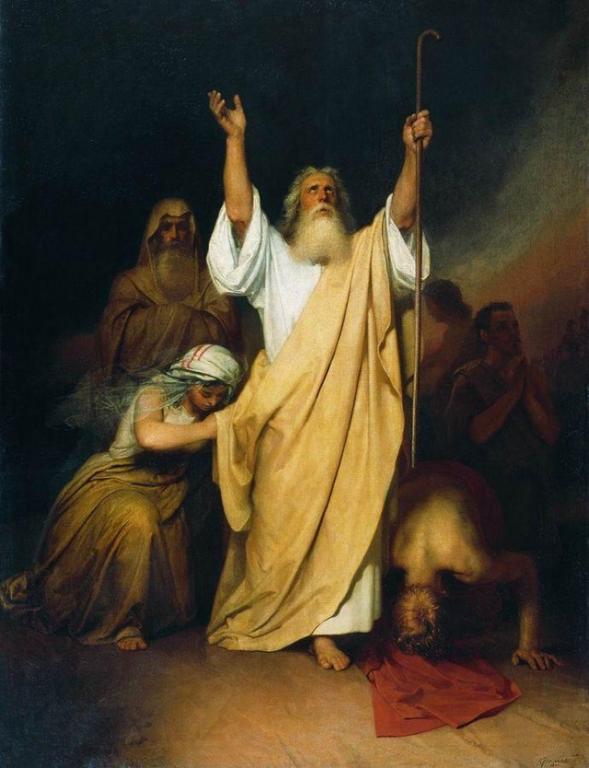
This is a reply to Matt Slick: Presbyterian pastor and head of the large and influential anti-Catholic Protestant CARM discussion forum. I am responding to his article, “Can Mary hear our prayers?”. His words will be in blue.
*****
There is nothing in the Bible that says that Mary can simultaneously hear the prayers of people all over the world, in different languages, spoken, and thought, an attribute that God possesses. But, the Catholic Church says she can. . . .
Roman Catholics all over the world offer prayers to Mary on a regular basis and expect her to hear them and intercede for them with God and Jesus. This is unfortunate because it isn’t biblical. They have gone beyond scripture.
Not everything in the Bible or every Christian doctrine held has to be made explicit there; the Bible never teaches that. What is required is that a doctrine must be in harmony with the Bible, and not contradict it. Thus, we might observe that the Bible never states that Mary can’t do these things. Nothing in the Bible denies that God can grant extraordinary qualities such as this one to His creatures when they are in heaven with Him.
We know that God can hear simultaneous prayers because He is outside of time (a Catholic dogma). C. S. Lewis compared this to God being an author of a book and our being the characters in the book. The author can go away for two years and then come back to his book and its fictional “timeline” as if no time has passed by. That’s how God is with our prayers. He’s not constrained by time because He’s not in it in the first place, as its creator.
The question then becomes: are we creatures also outside of time (or do we at least transcend earthly time in some fashion?) when we get to heaven and enter eternity? Many philosophers of religion have thought so, on the grounds that heavenly eternity (for creatures) is not endless succession of time, but rather, the cessation of time as we know it from a particular point forward (rather like a ray in geometry). There are many mysteries about heaven, but who can say what it will be like: including our experience of time or lack thereof? It’s certainly possible that we could be outside of time: not eternally like God, but from the moment we get to heaven.
I couldn’t access the article for free, but “Time in Heaven: From Glory to Glory,” by Scott Steinkerchner OP, has an intriguing abstract:
This article addresses three questions: Is there time in heaven? If so, what is it like? and How does it relate to time in this universe? In dialogue with modern science, this paper argues that since Christianity believes in the resurrection of the body and life everlasting, it should also affirm that there is time and space in heaven. Thus, rather than picturing heaven as a changeless, eternal moment, it is better to picture is as an everlasting experience of advancing from glory to glory. The time and the space in heaven is not the same as the time and the space in this universe, but the relationship between spacetime in heaven and spacetime in this universe in shrouded in mystery. While in this universe time always advances in one direction, in heaven, we might be able to move both forwards and backwards in time, though always moving forward in glory. It is also possible that the saints in heaven could revisit different times on earth, making for a complex interaction between heavenly and earthly timelines that could explain how the saints in heaven can hear and respond to earthly prayers.
If indeed this is true (and I see nothing in the Bible that undeniably contradicts it), then it is entirely possible that Mary and other saints in heaven can not only hear our prayers, but hear the prayers of millions, because of being in a different state vis-a-vis time. And they would be able to do so because God willed it to be that way and gave them that power.
The main verse The Roman Catholic Church uses to support their idea about Mary hearing prayers is found in Revelation 5:8. . . .
- NASB, “When He had taken the book, the four living creatures and the twenty-four elders fell down before the Lamb, each one holding a harp and golden bowls full of incense, which are the prayers of the saints,” . . .
Nothing in that verse says that anyone hears the prayers of the saints. It is a figurative context and is not explicit.
It may not say specifically that they “hear” them, but that notion is consistent with their having “the prayers of the saints.” What are they doing with them in the first place, if indeed (as Protestants tell us, as one of their unbiblical traditions) only God can ever be prayed to and receive prayer?
Slick provides four commentaries in an attempt to minimize the clear import of this text, and even one of those (Jamieson, Fausset, and Brown) admits that it is a mystery; that these saints are “employed by God in some way unknown to us to present our prayers (nothing is said of their interceding for us) . . .”. This famous commentary concedes that they possess “our prayers” and present them to God. This makes them intermediaries, and is completely consistent with the notion that they are indeed interceding for us, which means in turn that they heard our prayers before God did, and presented them to Him.
Otherwise, why are they involved at all? Neither Slick nor his four commentaries have proven otherwise. If only God can be prayed to, and only directly, why in the world would Scripture present such a scenario? It seems like this would be the last way to portray it if Protestant assumptions are correct.
. . . does the text actually say that they hear the prayers? No, it does not. The saints in heaven offering the prayers doesn’t mean that they can hear the prayers of people on earth. The Roman Catholic Church has read a doctrine into the text.
It’s perfectly plausible and consistent to assert that they heard prayers, if they possess them. And it is because of things we do know: having been informed by Scripture. We know that saints are intensely aware of earthly events, like spectators in an arena, watching (see my paper on Hebrews 12:1). If they have such an awareness, it simply cannot be ruled out that they could hear our prayers, as part of that, and can function as intercessors for us. Jeremiah 15:1 (RSV) implies that Moses and Samuel could intercede after their death:
Then the LORD said to me, “Though Moses and Samuel stood before me, yet my heart would not turn toward this people. Send them out of my sight, and let them go!
Abraham — after His death — is prayed to (asked for intercession) in a story (not a parable) told by Jesus Himself (Luke 16). So is the prophet Samuel (by Saul). Thus we know, with direct, explicit Scripture, that dead saints 1) observe us, and 2) can be prayed to. What more does one need? This being the case, it’s altogether fitting and plausible that Mary the Mother of God the Son Jesus, would be particularly involved in such loving intercession, by God’s will.
Now, even if it were possible that this verse could be interpreted to mean that the saints in heaven can hear Christians’ prayers, which I don’t assert is legitimate, it still does not mean that Mary can hear the prayers of people all over the world, simultaneously, both thought and spoken, and in different languages.
I explained how that is entirely possible and plausible, in the first section above.
If the people in heaven are aware of the prayers, it doesn’t say how they are aware.
It doesn’t have to. All we need to know is that they are aware. If they are, then they are involved in the process, regardless of the “how” and the “mechanics” of it. We know it is through God’s power.
I am aware that my friends pray to God but I don’t know what those prayers are unless they tell me. I cannot read people’s minds nor do I hear the prayers they give to God unless I’m physically present with them and they’re speaking out loud. So, the Roman Catholic church is stretching the verse beyond its intent and not being logical in its examination. The Catholics are committing the interpretive error called eisegesis.
None of this logically follows because of the difference of being in heaven and in a different relation to time, compared to being on earth, and because we know that dead saints can receive intercessory requests and present (as we would expect) them to God.
Roman Catholics say that heaven is not like it is here on earth and that we don’t know what Mary can and cannot do in heaven; therefore, they say, why can’t she hear our prayers and answer them. But this is an argument from silence. We should not argue from what we don’t know. We should argue from what we do know. To argue from what we do not know opens the door wide to saying anything.
It’s a valid deduction (which is arguing from what we know) from philosophy of religion, based on what we know from Scripture: speculation on the nature of eternity and what it will be like for creatures in heaven. We know it will be extraordinary and that we will have glorified bodies and that now we only “see through a glass darkly” as Paul stated, and “eye has not seen” etc. what God has prepared for us. And we have scriptural examples of Abraham and Samuel being asked to pray for us after their deaths. These are the relevant passages that Slick needs to grapple with, but he appears utterly unaware of them.
For example, the Bible does not say anything about life on other planets. Therefore, should we conclude that there is life on other planets? Of course not.
We can’t know for sure, based on the Bible, but it also doesn’t rule it out, which is why C. S. Lewis argued that it is entirely possible and not ruled out in the Bible.
This is why the Bible says that were not to exceed what is written (1 Corinthians 4:6). It sets the scriptures as the guide that should not be exceeded. Our admonition from Scripture is to use the word of God as the footstool upon which we build our truths, not the ignorance of what heaven might be like and then use it to justify a teaching about Mary is not supported in Scripture.
The problem here is that 1 Corinthians 4:6, closely examined, is not a prooftext for sola Scriptura, as Slick falsely assumes.
We often hear how Mary can hear our prayers and even answer them. I’ve had Catholics tell me that other saints can hear prayers as well. Can they also hear prayers in different languages, both thought and spoken, all simultaneously from all over the planet? If they can, why the focus on Mary?
Because she is the Mother of God the Son, immaculate by God’s grace, and the greatest of all creatures. Therefore, according to James (“The prayer of a righteous man has great power in its effects”: 5:16), her intercessory prayers have more power than any other creature’s have.
Furthermore, all of the so-called Roman Catholic Saints are creatures. They were created by God who is infinitely greater than the they. Why go to Saints and pray to them when Jesus said to seek him (John 14:14; Matthew 11:28) and that he alone was a way to the Father (John 14:6)? Isn’t Jesus enough? Isn’t God the Trinity enough?
I just explained it. If indeed, 1) God wants us to pray for each other (as He does), and if indeed, 2) prayers of more righteous people have more power (as James 5:16 proves), and if indeed 3) dead saints can hear our prayers and 4) present them to God, then all of it makes perfect sense and is completely harmonious with Holy Scripture.
Of course God is sufficient… unless you take your eyes off of God and put it on your tradition. Then, new doctrines creep in and with it comes a host of errors.
Yes, of course He is. And this same God expressed His will in His inspired revelation that we pray for each other, as part of His overall plan, and that this includes prayers of the departed, who are more alive and much more powerful and knowledgeable than we are, and who remain part of the Body of Christ (communion of saints).
For a Catholic to be persuaded by Pastor Slick’s interpretation, would require our sincere and zealous Protestant brother to refute all of the biblical and reasoned argumentation I have presented. He ignored almost all of it in his own “biblical” presentation, so his case is hardly compelling. It simply neglects (how ironic!) too much Scripture. We can’t pick and choose only what we like in God’s Word: only what fits in with existing arbitrary traditions of men.
We have to incorporate all of its relevant teachings into our analysis on any given topic. But sacred tradition is a valid thing, too, which is itself expressly sanctioned many times in Scripture, as part of the rule of faith, along with (also) the authority of the One True Church: set up by our Lord Jesus and perpetually guided and preserved from error by the Holy Spirit.
***
Photo credit: Prayer of Moses after the Israelites go through the Red Sea (1861), by Ivan Kramskoy (1837-1887) [public domain / WikiArt]
***













